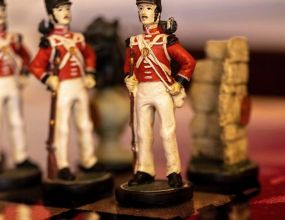
How does serving in the military affect a person’s social status? That is a question with many different answers. In this article, we try to answer how it has affected Roma people in Sweden and Finland during the past centuries.
In Romani Chib, all words for weapons have a history that can be traced back to India. This creates the theory that Roma people originally came to Europe as military people. We can not be sure if this is true or false, however, it is certain that many Roma people throughout history have been drafted in the military services. Not least in the Nordic countries, especially Sweden and Finland. It has in some cases held the function of a tool to integrate Roma people with the rest of society, but in other cases, it has left the Roma people more marginalised than before they were drafted.
While Sweden today is known to be a neutral country, not having been engaged in warfare for centuries, that has not always been the case. The Swedish Kingdom had power over Finnish territory until 1809, when Russia won it in a war. At that point, there had been wars on the Swedish-Russian border on and off for around 200 years.
Roma people have been seen as attractive by the Swedish and Finnish military services for many reasons. Before industrial times, Roma people were largely appreciated because many had certain skills that the majority population often did not have. Roma people were known for being skillful gunsmiths, and could be hired to take care of the weaponry of the military. Some Roma also had specialized knowledge in animals, especially horses. Farmers would hire Roma to take care of and castrate their horses. Since castrated horses were easier to control they were used in warfare, and Roma people would be hired to castrate the horses that were used within the military. But working in the military was not like any job, Roma men often had something to gain from being part of the military.
One important aspect of being involved in the military was that Roma people through this could acquire a certain legal status in the city where they resided. It can be described as an “urban citizenship”, and it gave privileges for craftsmen and traders to trade within the city, and also to travel with their business. Moreover, one would acquire a higher status within the cities’ decision making. However, people with urban citizenship also had the obligation to pay taxes, and in some cases, to partake in the military services when asked to.
There are many records of Roma people with urban citizenship from cities in the region of Småland in the south of Sweden. For example, in the city of Vimmerby, the first known Roma who acquired urban citizenship was named Johan Henrichsson, and was first denied urban citizenship. However, when he acknowledged that he had served in the military, he got urban citizenship, as well as his brothers and later also his son. They were the first of many Roma in Vimmerby to get urban citizenship.
At the time, the fact that Roma people received it was not appreciated by everybody, but many politicians liked the development since it helped the economy of the cities and made them grow by population. Today, scholars claim that the urban citizenships helped Roma communities integrate into the majority society, and to acquire a higher social status.
At the same time, the big number of Roma people in the military seems to have worsened Roma people’s reputation as a group in Finland and Sweden. Working in the military at this time and place was not a stable job, and it did not provide a stable source of income. During furlough, or periods in between jobs, the soldiers, both Roma and non-Roma, often had to find other ways to make money. For non-Roma people, this made it complicated to provide economically for their family. For Roma people, it had the same effect, but in addition, it also enforced the already existing stereotypes about Roma people as unreliable vagrants.
One can also discuss whether or not the Roma people received the same treatment as their non Roma colleagues in the military. It is difficult to say anything about this with certainty, since the historical documents do not give us too much information. However, knowing the general historic position and public view of Roma people in Scandinavian and Finnish societies, as well as in Europe in general, it is not difficult to assume that they might have worked under different predispositions than their non-Roma colleagues.
As an institution, the military helped many Roma people on an individual level, considering the many Roma people who received urban citizenship because of it. Although, as a collective, some scholars suggest that Roma people were harmed by the strong connection to the military, as it put them in an economically unstable situation as well as worsened already existing stereotypes.